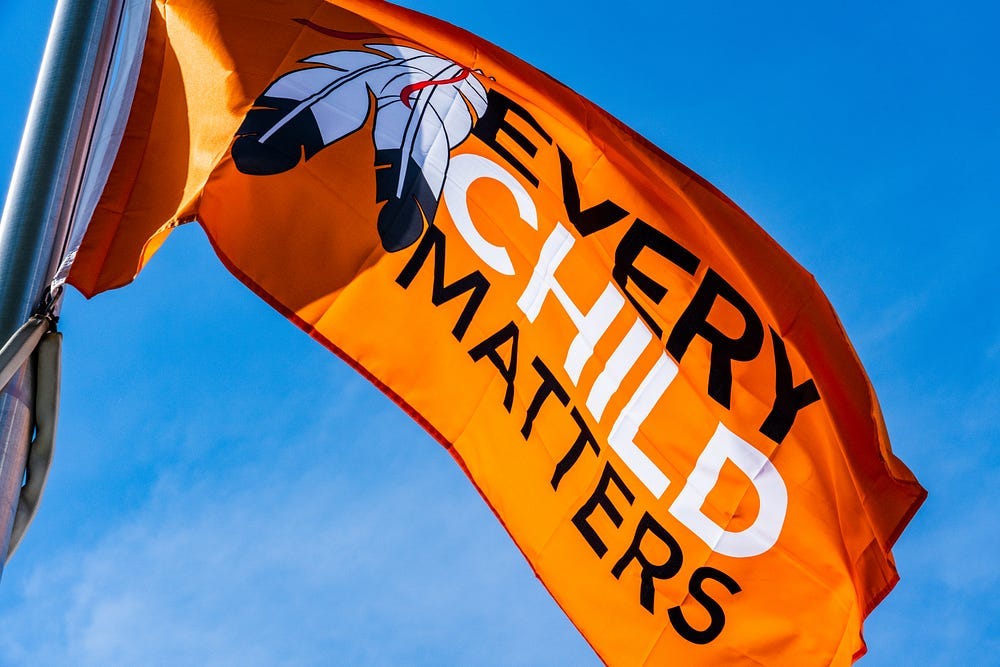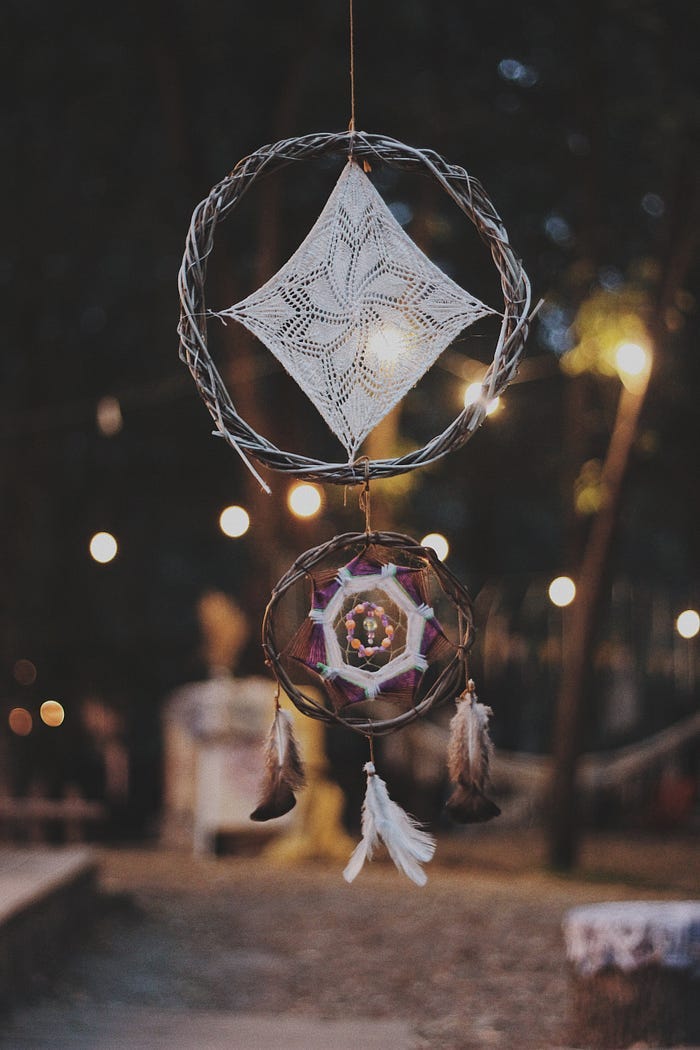Truth and Reconciliation Day: Remembering the Victims of Canada’s Genocide
Every child matters

I usually publish two articles a week; one on Monday morning, and one on Wednesday.
I’m breaking that streak this week to post a day early. Today is a very important day in Canada, and I want to take a moment to pay my respects and shed some light on a piece of our history that many Americans might not know about.
Today is the National Day for Truth and Reconciliation.
Today, we remember the victims and survivors of Canada’s genocide.
This is a day of remembrance. A day to sit down and listen to the survivors tell their stories and to hear the names of those children who never made it home. The children who never saw their families again after being ripped violently away from them by a government decree.
For over a hundred years in Canada, our government funded and maintained a network of boarding schools. The Residential School system existed for one purpose:
“Our object is to continue until there is not a single Indian in Canada that has not been absorbed into the body politic, and there is no Indian question, and no Indian department, that is the whole object of this Bill.” — Duncan Campbell Scott
We call them schools. It would be more appropriate to call them indoctrination and torture centers, as that more accurately describes what those children went through.
Note that I said survivors. Current-day survivors.
There is a misconception that Canada’s genocide of First Nations people is old history, that it was a crime carried out by our ancestors, and that we living people today have no responsibility to bear the burden of those actions.
I am a 31-year-old woman. My mother was 23 when the last school closed its doors.
When the last school closed, I was 2 years old.

It’s common for people to equate the term ‘genocide’ with mass murder.
While that is not necessarily incorrect, it’s only part of the truth. The definition of genocide encompasses many facets, and typically, each occurs at a different stage of a 10-step escalation.
I’ve written about the stages of genocide here if you want a more thorough explanation of the term and how it can be applied. There is no doubt that Canada’s actions with the Residential School system — among other things, such as systemic sterilization and the ‘Starlight Tours’ — constitute a genocide.
The Residential School system existed to obliterate the cultures, languages and traditions of our native First Nations. Children were stolen from their families, forced into Christian indoctrination, beaten for speaking their own languages or remembering the non-Christian names their parents gave them.
Abuse was rampant. Often sexual abuse. Disease, injuries, malnutritian and exposure were commonplace. Tiny children, even little toddlers, were subjected to brutal torment to ‘kill the Indian in the child’ as was the stated goal — forgive the terminology, but that’s what they said.
The people in charge of this system said they meant to turn these children into ‘apples.’ Red on the outside, white on the inside. Again, forgive the awful words; they’re not mine.
To call someone an ‘apple’ in Indigenous communities remains a slur to this day.
When I was a child, we never heard about these things. We got the whitewashed history in school, with barely any information about the First Nations of Canada at all. We only got the ancient history, the first meetings between settlers and the native peoples of North America.
Or rather, the myth of the first settlers. We heard about Columbus ‘finding’ America, but we weren’t told anything about how he was a mass murdering slaver who massacred several cultures. And we weren’t told anything about who visited our shores before he got here.
We were taught so many things that just don’t reflect reality, and the modern Residential School system never once came up in the classroom. They operated in my lifetime, but I didn’t hear about them until I was an adult.
You can imagine my horror. Why did I not know? How was it possible that such a monumental, monstrous thing had happened in my country, and nobody ever spoke about it?
Of course, now I understand why. Nobody wants to carry the responsibility of genocide, and the perpetrators covered up a lot of it to save their sorry hides.
Step 10 of any genocide is always a denial and a cover-up.
Truth and Reconciliation is a small step in the direction of taking accountability for what happened and about what’s still happening right now.
It’s about raising awareness of the atrocities, learning the truth about our history, and listening to the stories that have been covered up by lies and misinformation.
It’s about dispelling the myths. Learning about the real, horrifying history is not about instilling a sense of guilt. It’s about being able to recognize the patterns when they appear again and about ensuring that we don’t sit blindly by when old racist attitudes raise their ugly heads.
It’s about taking a look at what’s going on in the present. It’s about making the decision not to perpetuate the climate of ignorance that allowed these crimes to go unpunished.
We can’t retroactively right the wrongs that we didn’t know about. But we can learn from the past and move forward with open eyes.
Especially now. If you’re horrified by what’s happening south of our border, well… we did that, and worse.
If we want to be better people now, we have a duty to stand up and speak out.

You can’t heal a wound if you don’t treat it. Sutures hurt, and they itch like mad, but an open wound will only fester if it isn’t washed clean and tended.
Our history of genocide is an open wound, and we’ve only just begun to turn our attention to the tear. We have to cut away the lies, the little bandages that hide the injury but aren’t enough to help it truly heal.
Only by exposing the true depth of the wound will we be able to mend it.
We can’t undo what’s been done in the past, and we can never undo what our survivors have gone through. But we can show them respect, hear what they have to say, and take steps to ensure that no child ever has to go through it again.
On Truth and Reconciliation Day, we say that Every Child Matters. That is a promise, a vow, an oath to future generations that we will never fail so badly again.
If we want to call ourselves good people, and a good country, then we have to keep that vow. As a nation, as a collection of communities and families and friends. We have to be better than our parents were.
We have to be better than we were. And I have hope that we can be.
Solidarity wins.


Thank you for the lesson that All Americans should hear. Unfortunately there are many who will not heed this terrible path you endure and learn nothing.Thank.you again for the look into the path and future of my country and for those who care.
Reconciliation will take years, and what took place must never be forgotten. My granddaughter was shown the truth at an event at age 9 about 3 years ago. The stories they told shocked her, but she is now incredibly aware that many people died and vastly more were damaged. A generation here is growing up with the truth, and it is helping our society.
And you know what? I believe that the survivors and their descendants are a sort of glue now that actively helps hold Canada together. Yes, they have some special rights. And, yes, the rest of us owe them a lot. They are nations within the Canadian nation while generally being among the most loyal of citizens. And many like myself deeply appreciate their societies.
They fought alongside fellow Canadians in war. They fight to save the environment and by extension the planet. They give more than they receive. So I apologize on behalf of the past and present but look forward to their continued participation in making Canada a great place.